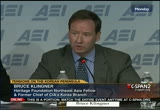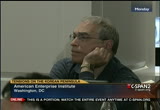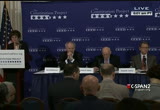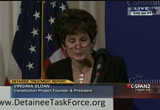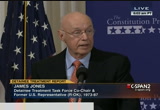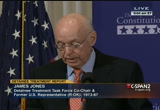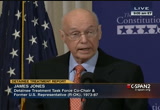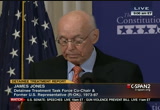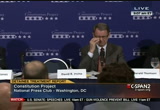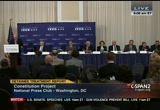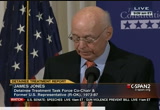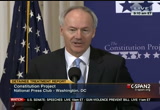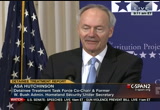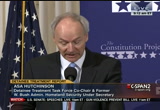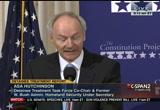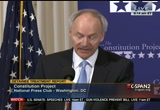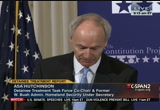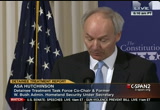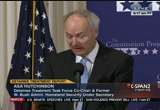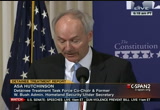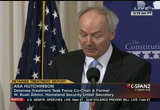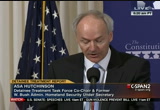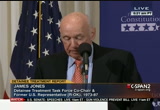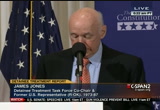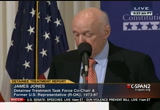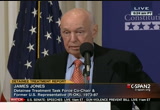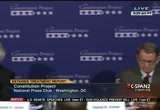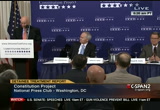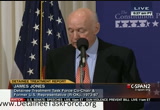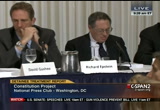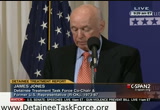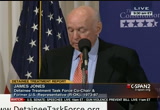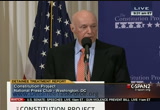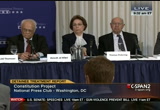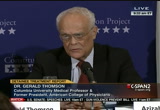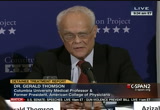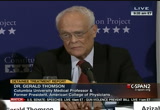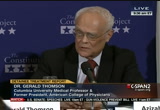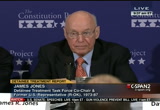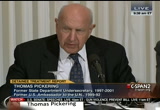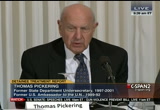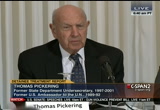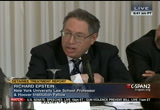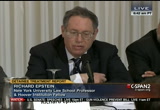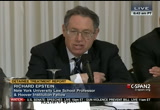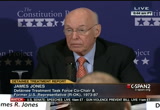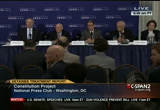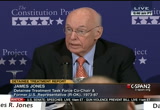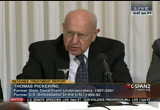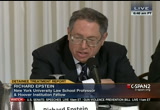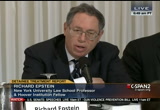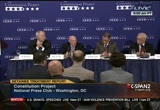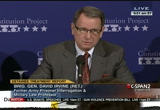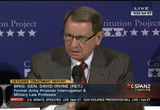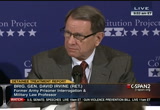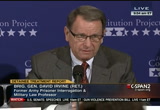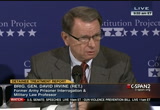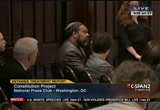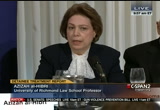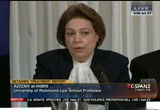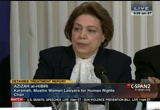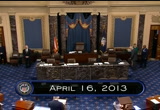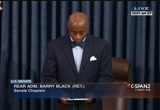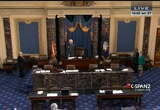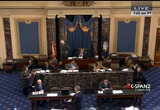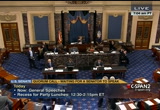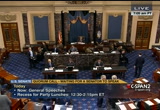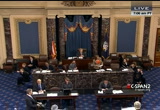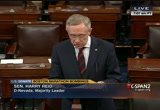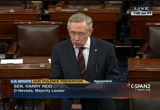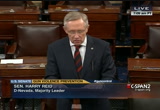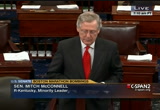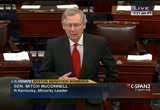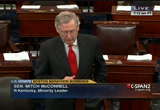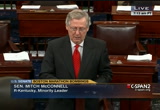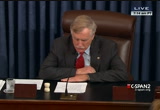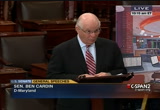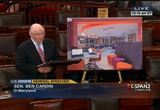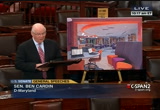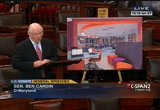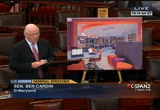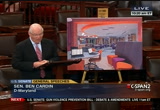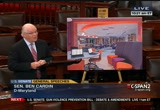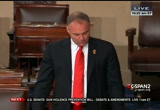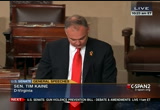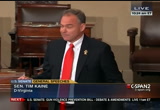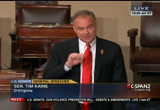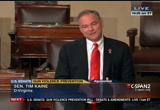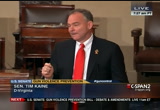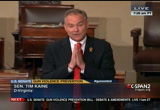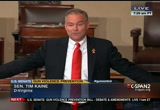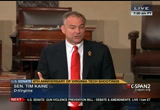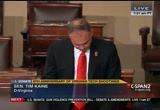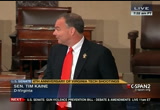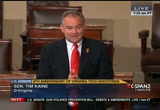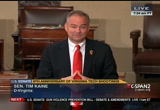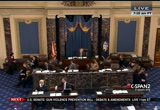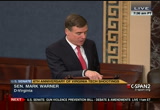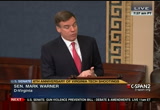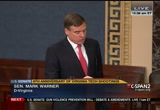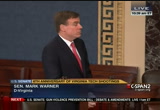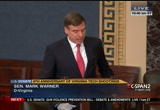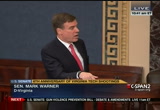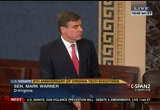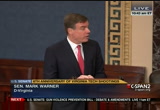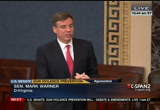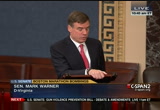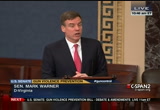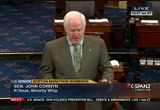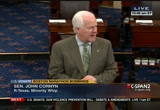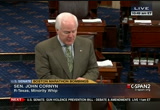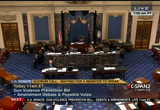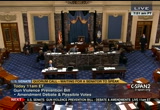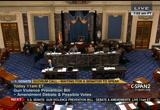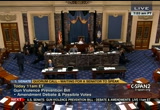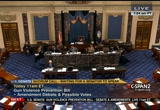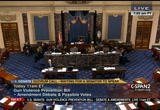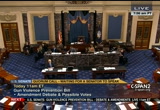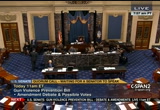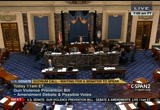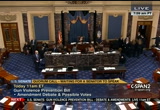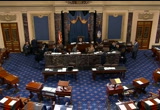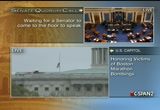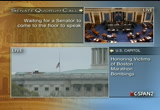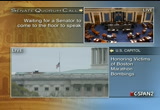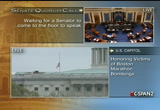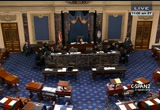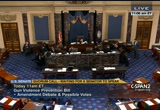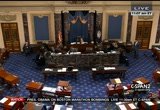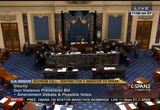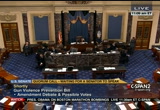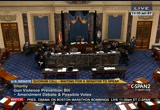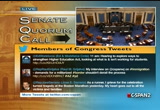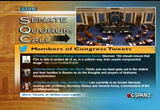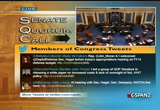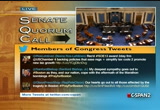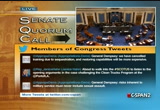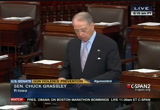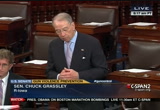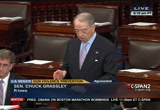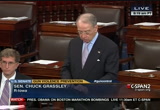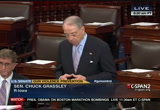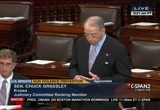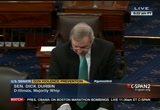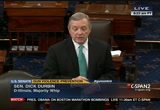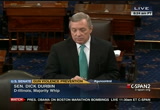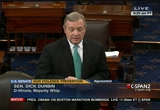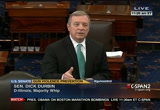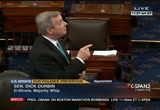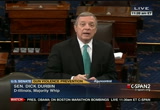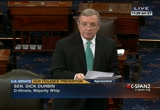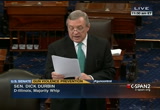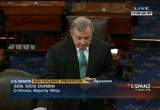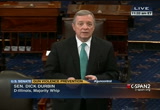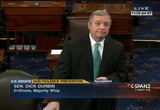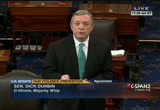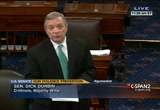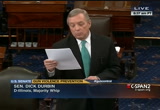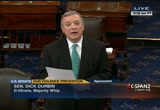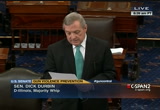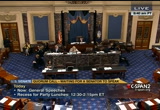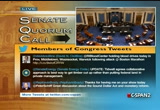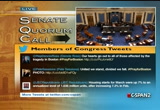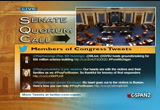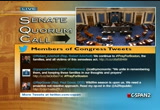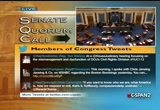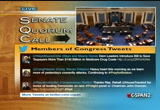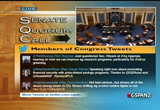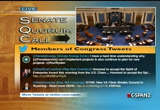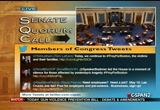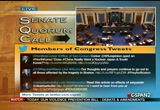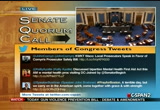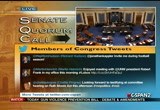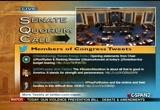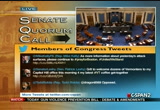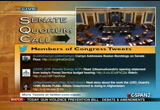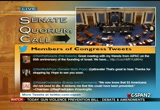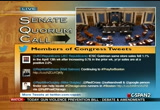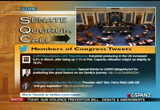tv U.S. Senate CSPAN April 16, 2013 9:00am-12:00pm EDT
9:00 am
korea, actually you even you have to some degree in china. and you also, unlike the eastern europe, you don't have or other countries, you don't have a hobble. you don't have an aung san suu kyi. you don't have a mandela for people to rally around. there's no formal opposition party. there's not even really informal opposition movement that you can point to other than sort of graffiti, conducting graffiti. there's no government in exile. it seems come until the moment it happens, that you just don't have the conditions there like you have for the arab spring. obviously, i've been saying sort of this for 20 years and i'm always fearful that tomorrow morning we'll see the headline of north korean leader has been given a nine mm headache. but so far it hasn't happened because of all of those conditions. >> well, the u.s. senate today
9:01 am
turns its focus back to legislation aimed at reducing gun violence. centers will gavel in at 10 a.m. for general speeches for debate on amendments to the firearms bill set to get underway about 11 a.m. first focusing on expanding background checks to in sales sponsored by senators to meet, republican from tennessee, and senator manchin. senator toomey from pennsylvania and senator manchin from west virginia, a democrat. the citizens committee for the rights to keep and bear arms to other amendments dealing with banning assault weapons, conceal carry permits and hide ammunition clips expected to come up with what is expected to be a weeks long to be. see live coverage this morning at 10 a.m. eastern right here on c-span2. live now to the national press club where the detainee treatment task force is releasing its findings this morning after a two-year investigation. this is just getting under way. >> recognized experts in law, medicine and ethics.
9:02 am
the group includes conservatives and liberals, republicans and democrats. and you can find her biographical information in the press kit and in the report itself. the constitution project is enormously grateful to the members of the task force for their diligence, dedication, time and courage. they all contribute a remarkable expertise and stake their considerable personal and professional reputation to produce this report. i also want to thank the staff that guided the task force, which was extraordinarily diligent, meticulous, and hard-working. the american public owes both the task force members and the staff a debt of gratitude. eight a the 11th of the task force are here today, as is neil lewis, the task force's wonderful executive director. i'm pleased to introduce one of the groups co-chairs, ambassador james jones will begin the presentation. thank you.
9:03 am
>> thank you very much for the introduction. let me first say that personally and on behalf of the task force members, i want to express our sympathy and our solidarity with the people of boston on yesterday's tragic activity. it's once again demonstrates we who live in the freest, most open democracy in the world, we sometimes have to pay for that. last night i saw an interview of a 78 year old runner who was the first one to be hit by the bomb, and he was interviewed later. and one of the questions they asked him, does this mean that you probably will not run in this race again? he said, absolute or not. i will be here and i'm not going to let those people run me off. so that is the attitude of americans on this kind of
9:04 am
tragedy. it's our resilience, and we found that to be true in some of our deliberations on this task force. what distinguishes the united states and makes us the envy of the world is our adherence to common values. and one of those most important values is respect and adherence to the rule of law. and what we tried to do in this report was to point out where that, where we separated ourselves in our official actions from those values, and how we must get back on track. this week marks the 25th anniversary of president reagan's united nations convention against torture and other cruel, inhuman and degrading treatment or punishment. in his message to the senate, president reagan's said that
9:05 am
ratification of the convention quote will clearly express the united states opposition to torture, and a board practice unfortunately still prevalent in the world today. little could he have known at the time that america would itself engage in this board practice, particularly in the aftermath of the terrorist attacks of september 2001. the constitution project task force, as jayme said, was broadly based. was bipartisan, that all political thoughts cover. with expertise in all of the rounds, professional realms that were needed to study this issue. the project was undertaken with the belief that it was important to provide an account as authoritatively and accurately as we could. so that how the united states treated people that were held in
9:06 am
this custom, which was mobilized to deal with the global terrorist threat. on taking office, president obama declined to undertake an official study of what happened. senator leahy introduced legislation to establish a truth commission, and congress failed to act on it. so in many respects, this task force, this report is the comprehensive examination of the treatment of suspected terrorists that official washington has been reluctant to conduct. task force members believe that having an understanding of what occurred during this period of serious threat and willingness to acknowledge any shortcomings strengthen the nation and equip us to better cope with any future crises. it knowing what happened, our reputation, as an exemplary practitioner of the rule of law,
9:07 am
will clearly be damaged. the task force is made up of as jenny said, a broad cross-section of folks have been in government, who understand government, who understand military, who understand the role of intelligence. the bios are in your folder but i would like to take just a minute to introduce them at this time. dr. gerald thomson, the former, our professor emeritus at lumbee university school of medicine. richard epstein is the professor of law, new york university, and university of chicago. dr. david gushee, professor of christian ethics and writer of so many books, i could not possibly read them all, of mercer university, but clearly an authority and expert in the area of ethics.
9:08 am
doctor azizah al-hibri, professor emerita, university of richmond school of law. general david irvine, who had a distinguished career in intelligence in the military as brigadier general, was a four term republican legislator from utah and currently practices law in salt lake city. tom pickering, who is perhaps in our history one of the most distinguished ambassadors and diplomats we've ever had, having been an ambassador seven times and undersecretary of state. we were aided by tremendous staff headed by our executive director nicholas is already been recognized, former "new york times" reporter. also on the staff, captain ken feiler, counsel, administrative. also we were aided a few times by adam, another former "new
9:09 am
york times" journalist. and their bios are also in the packet. this study has a vast amount of information. a result of more than two years of research, analysis, and the liberation. it is based on a thorough examination of the available public records and interviews with more than 100 people, including former detainees, military and intelligence officers, interrogators and policymakers. the task force staff and members conducted on the ground fact-finding in afghanistan, iraq, libya, let the winnie, poland and the united kingdom, and also at guantánamo bay. although we don't have subpoena power, or access to classified information, we believe that this report is the most comprehensive record of detainee treatment across multiple administrations in multiple
9:10 am
geographic theaters. that has been published today. we also the dedicated website which went live this morning that has additional supporting information. so at this time having set the stage for this i would like to turn over to the co-chairman of the task force, the former republican congressman from arkansas, the former under secretary of the department of homeland security, president george w. bush's administration, and someone who added great wisdom and great knowledge to the deliberations of the task force, asa hutchinson. >> thank you, jim, and thank you for your leadership on the task force. and i want to express my thanks to the constitution project but also to all of my fellow task force members, what they brought
9:11 am
to the table in terms of experience, wisdom, public service really made a difference in the development of this project and important report. as jim mentioned, there's more than 24 findings and recommendations. we can't cover all of those this morning, but we do want to hit some of the highlights. we hope you'll take the entire report, study it through, and look at each of those recommendations. why is this report important? it's important because we as a nation have to get this right. i look back in history to the time during world war ii that we interned some japanese-america japanese-americans. at the time it seemed like the right and proper thing to do. but in light of history it was an error. and so today, this report will
9:12 am
hopefully put into focus some of the actions taken in the post-9/11 environment. there's some key questions one of -- some key questions we wanted to address this point but to the treatment of suspects -- rise to the level of torture quick secondly, if so, how did this happen? and what can we learn from this to make better decisions in the future? on the first question, we found that u.s. personnel in many instances use interrogation techniques on detainees that constitute torture. american personnel conducted an even larger number of interrogations that involve cruel, inhumane or degrading treatment. both categories of actions violate u.s. laws and international treaty obligations. this conclusion is not based upon our own personal impressions, but rather is grounded in a thorough and
9:13 am
detailed examination of what constitutes torture from a historical and legal context. we looked at court cases and determined that the treatment of detainees in many instances met the standards, the courts have determined as constituting torture. but in addition you look at the united states state department in its annual country report on human rights practices, has characterized many of the techniques used against detainees in u.s. custody in a post-9/11 environment. the state department has characterized the same treatment as torture, abuse, or cruel treatment when this techniques were employed by foreign governments. the cia recognized this in an internal review and acknowledged that many of the interrogation techniques that employed were inconsistent with the public policy positions that the united states has taken regarding human rights. the united states is
9:14 am
understandably subject to criticism when it criticized another nation for engaging in torture, then justifies the same conduct under national security arguments. there are those that defend the techniques of, like waterboarding, stress and sleep deprivation because there was the office of legal counsel, which issued a decision of proving of their use because they defined them as not being torture. those opinions have since been repudiated by legal experts and the olc itself. and even in it his opinion it relies not only on a very narrow legal definition of torture but also on factual representation about how the techniques would be implemented that later proved inaccurate. this is in important context as to how the penny came about but also how policymakers relied upon it.
9:15 am
based upon a thorough review of the available public record, we determined that an application, torture, was used against detainees in many instances and across a wide range of theaters. on the question of responsibility or how did this happen, any effort to understand how the government decided to approve the torture of detainees must begin with the recognition of the fear and anxiety that enveloped our country after 9/11. we have a small taste of this debate even after the events of yesterday in boston, and we desire first responders, law enforcement and the public to know the perpetrators of this incredible act of violence. the intensity was even much greater post-9/11 because of the incredible loss of life. and the greatest concerns of americans and our leaders in that period were simply preventing further attacks. task force members understand
9:16 am
clearly that those officials whose decisions that contributed to use of torture undertook those measures as their best efforts to protect our fellow citizens. and while our report is critical of the approval of interrogation techniques that ultimate lead to u.s. personnel engaging in torture of detainees, the investigation was not an undertaking of partisan full findings. our conclusions about responsibility should be taking very simply as an effort to understand what happened at many levels of the u.s. policymaking. there's no way of knowing have the government would have responded if a democrat administration were in power at the time of the attacks. indeed, our report is equally critical of the rendition to torture program which began under president clinton and we question several actions of the current administration as well. should be noted that many of the
9:17 am
corrective actions that were first undertaken during the bush administration as well. but the task force did include that the nation's highest officials after the 9/11 attack approved actions for cia and defense personnel based upon legal guidance that has since been repudiated. the most important decision may have been to declare the geneva convention did not apply to al qaeda and taliban captives in afghanistan or guantánamo. the administration never specified what rules would app apply. the task force believes that u.s. defense intelligence professionals and servicemembers in harm's way need absolutely clear orders on the treatment of detainees, requiring at a minimum compliance with common article iii of the geneva
9:18 am
convention. this was not done. civilian leaders and military commanders have an affirmative responsibility to ensure that their subordinates comply with laws of war. president obama has committed to observe the geneva convention through an executive order, but a future president could change it by the stroke of a pin. congress, one of our recommendations, needs to work with the administration to strengthen torture statute, the war crimes act and uniform criminal to justice to remove the loopholes that allow torture to occur. in terms of the cia and we did not have access to classified information. this is the reason we're asking the administration to review much of the classified information to see what can be released without compromising national security and provide more transparency in light on how the policy decisions were made. dr. david gushee would be happy to answer questions when they
9:19 am
conclude about the responsibility and how the absence of clear standards led troops on the front line in an untenable position. on the question of effectiveness of torture there is no persuasive evidence in the public record that the widespread use of torture against suspected terrorists was necessary. that is, that it produced significant information of value that could not have been otherwise obtained. i'll just simply make two points, and observation in this regard. the task force believes it is important to recognize that is, that to say torture is ineffective does not require a demonstration that it never works. a person subjected to torture might well divulge useful information, nor does the fact that it may sometimes yield legitimate information to justify its use. what values do americans stand for, that's the ultimate question. but in addition to the very real
9:20 am
legal and moral objections to its use, torture often produces false information and it is difficult and time-consuming for interrogators and analysts to distinguish what may be true and usable from that which is false and misleading. also, conventional lawful interrogation methods have proven to be successful whenever the united states uses them throughout history, and i've seen this in law enforcement as well. we see no evidence in the public record that the traditional means of interrogation would not have yielded the necessary intelligence following the attacks of 9/11. general david irvine who taught prison of or interrogation for 18 years with the sixth army intelligence school is on the task force, will be happy to answer questions about the effectiveness of torture. those are a couple of the key findings, but there are many more findings in the task force
9:21 am
report that hope you will review. this has been an important task that we have engaged in, but we understand how difficult it is for a nation to come to terms with what these findings are in these recommendations. we hope that we will learn from these and approve policymakers decisions in the future. and with that alternate back to my co-chair for questions and answers. >> thank you very much, asa. they asked me to highlight a few other things in the report, identify some of our task force members to whom you might want to ask questions. the effects and consequences, the report looks at the impact of our actions on our relationship with other governments in the world. a special interest is the extraordinary rendition program,
9:22 am
after september 11, 2001, terrorist attacks, the bush administration resulted use every available means to protect the united states from further attacks. this extraordinary rendition program used previously by president clinton quickly became an important tool in that effort. and in the years since, numerous investigations and inquiries have found evidence of illegal acts in the form of arbitrary detention and torture resulting from the program. these need to be reviewed. we found an investigation extraordinary rendition by the task force, they uncovered many new details regarding the black sites in poland and let the weight in poland an official investigation has been hampered by the u.s. government's refusal to provide any come and share any information. even as the polish prosecutors have issued indictments against
9:23 am
polish officials. for their role in facilitating black sites. in lithuania, prosecutors face many of the same problems of not being able to get information shared with them from the united states government. in that particular case they closed the investigation in 2011, and while they admit that they were black sites there, they have no evidence of what prisoners were detained. there've been a number of inquiries into the program in the united kingdom including one by the house of commons and one by the all party harmony to regroup headed by a conservative mp. the task force will actually present our findings to them in june. due to the growing legal and political consequences of the cia's program and network of
9:24 am
secret prisons, and the fact that officials credibly assert that both programs have been discontinued, the task force recommends that the united states fully comply with its legal obligations under the convention against torture. and in cooperating with the pending investigations around the world and these lawsuits. president obama's early executive order also close the cia's black sites, but their effect on the cia's rendition of detainees to foreign custody is less clear. therefore, the task force makes specific recommendations of ways to strengthen the process of rules on those renditions in process of diplomatic assurances of those countries to which they are rendered. ambassador tom pickering can
9:25 am
answer the questions you have in this particular area of international and diplomatic issues we discussed. we also looked at the effects of our actions on former detainees. detainees are not traditionally an object of sympathy. and yet many of these detainees were found not to be guilty of anything, even though they did not have a trial. were released and relays virtually with no assistance, no help, no way to get back in the world. this is an issue i think of importance, and dr. al-hibri can answer questions with regard to those. a few words on medical in the legal profession in this effort. medical professionals including physicians and psychologists are
9:26 am
dissipated variously interrogation. rules and regulations and operating procedures were altered to guide physicians and their involvement in detention and interrogation procedures that put many of them in direct conflict with their national efforts. we offer several recommendations to preclude this in the future. we have, as i think asa mentioned, the for speeding car, and that for the military acknowledges that are 20, i think it's higher as of today, detainees at guantánamo that are conducting a hunger strike, 10 of whom are being force-fed. the press reports that lawyers of other detainees report that the hunger strike is much more widespread, involving a majority of the 166 men still held it there.
9:27 am
and that some have lost significant weight in recent weeks. again, this is a medical issue that i would suggest you direct your questions to doctor gary thomson. on the legal front, one of the things we found was that this was a war conducted less by the generals and more by the lawyers. the lawyers also did play a very key role. in the aftermath of the attacks, lawyers in the justice department's office of legal counsel provided legal advice that seem to go to great lengths to allow treatment that amounted to torture. the report offers a systematic examination of the ways of legal interpretations evolve in response to the court decisions and public pressure. the role of the olc in the federal government is unique. it is the president's law firm, and they have the responsibility to push back against
9:28 am
unreasonable institutional pressures from the white house or anywhere in government. the task force recommends that the olc should periodically review confidential opinions that determine if they may be declassified and released. is opinions from the olc might someday be disclosed, the olc attorneys would be more mindful of their responsibility. to act in an impartial manner and less likely to engage in advocacy. professor richard epstein is available to answer those questions. on the issue of the obama administration, during the 2008 campaign, president obama criticized the bush administration's treatment of detainees. candidate obama promised to close guantánamo and to reject torture without exception or
9:29 am
equivocation to the also criticized previous administration for executive secrecy, including repeated invocation of the state secret privilege to get civil lawsuits thrown out of course, and he promised to lead a new era of openness. the administration has fulfilled some of those promises, and inconspicuously failed to fulfill others. in some cases because congress has lost them but in other places -- block them. as mentioned earlier, i level of secrecy surrounding the rendition and torture of detainees cannot continue to be justified on the basis of national security. the authorized enhanced techniques have been publicly disclosed, and the cia has approved its former employees publication of detailed accounts of individuals and interrogation.
9:30 am
ongoing classification of gerald document these practices serves only to conceal evidence of wrongdoing and to make its repetition more likely. apart from redactions needed to protect specific individuals and to honor specific diplomatic agreements, the task force urges the president to direct executive branch agencies to promptly and fully declassify as much material about the treatment of suspected terrorists as possible. the convention against torture to which the united states is a signatory in addition is cohabiting all acts of torture in addition to prohibiting all acts of torture, requires that states the shore in our legal system that the victim of an act of torture obtains redress and has an enforceable right to fair and adequate compensation. united states has not complied with this requirement.
9:31 am
task force recommends that the state secrets privilege should be subjected to independent judicial review, and restrict use of the privilege to cases where it is truly necessary to guard against non-speculative harms to national security. as asa mentioned, we have 24 findings and specific recommendations, both for the legislative and the executive to act on. we urge you to read the report. if you think it is readable as opposed to just a dry set of words. and now let's close and open it up for questions. first of all, let me say that because we're trying to get the website and others to be able to understand the question, after you raise your hand come identify yourself and then wait for a microphone to come to you. we have two microphones on both sides of the room. so thank you for listening to our summation of the report.
9:32 am
who has a question? >> thank you for doing this. i am from al-jazeera english television. i have two questions. one, you mentioned a little bit about the for speeding of some hunger striking detainees at guantánamo. i wondered if you could talk, if the doctor to talk more about what the long-term impact of that is and you know, what can we see -- how can this situation be resolved? and that leads to my second question for the both of you about political will to do what the administration has said, it's intended goal of closing the facility and due process for many of the detainees as they can put on trial. you know, it seems there is no will on either side and they are just plain, congresswomen the
9:33 am
white house and the white house is blaming congress. what can be done to move both of these issues forward? >> the long-term impact can be seen i think in two ways. one, the potential impact on the detainees in terms of success, in terms of personal risk an injury. and second, what's going to be the impact politically of the situation on guantánamo? you know that the task force came out very strongly condemning forspeeding, and this is in keeping and in line with international ethical standards, both the professional treatment of hunger strikers and the ethics of feeding hunger strikers. we do not think forspeeding should be an approach to the hunger strike but if you can imagine being a detainee and using refusal to eat as a form
9:34 am
of protest, and then you are forced to eat, forced, physically to beat by being strapped into a special in a chair and restrained, having restraints put on your lens, your arms, or legs, your body, your head so you cannot move. having tubes inserted in your throat and your trying to resist that was the only muscles that are free in your throat. pain, discomfort odds of the. but in addition to that, who defends -- you are kept in a chair for at least two hours, usually more than two hours to prevent you from vomiting and undermining the for speeding -- force-feeding. you can't go to the bathroom during that time. your dignity is taken away. the world medical association
9:35 am
and international escort identified that process as cruel, inhuman and degrading treatment. and whatever given the level of brutality could extend to torture. now, since you're refusing food, that's going to happen to you twice a day. day after day, month, and week after week. and for some detainees it has gone on for years, as much as four years or longer. no question that that is great risk to the detainee. and if the detainee is not treated properly, some damage can occur, and, obviously, there's always the risk of death. we worry about his hunger strike. it's not the first as you all know at guantánamo bay. perhaps the most dramatic focus and extensive were in 2005, and there were two dealing with conditions of the camp and
9:36 am
beginning to come to grips with detainees with extended detention, the hope of getting out of guantánamo bay. the first part of the 2005 ended because the detainees thought they were going to be application of the geneva convention and they were in discussion. when that didn't happen they had the second hunger strike, and it was during that hunger strike that the restraint chairs in the force-feeding in the constraint chairs was introduced. this now is a hunger strike occurring with very different circumstances. the last hunger strike seems to have been broken by the use of the force-feeding. because the numbers dropped off dramatically. during the force-feeding. in addition, you have to believe that there was some hope in association with that, that the detainees saw in addition to the
9:37 am
force-feeding. this time we are dealing with force-feeding and hunger strikers who may have much, much less hope. in fact, it is the reason for the hunger strike is the absence of hope. so we are concerned first of all the force-feeding is being used. second, we don't have a lot of transparency about how that is being done. and third, it's very hard to see if we're going to have a result outcome your. -- outcome here. >> when will the political will come about with congress blaming the administration committee of ministers shall blaming congress. before you got to guantánamo bay i thought a budget, gun control, immigration. that seems to be prevalent in washington these days. i would point out that we had and in unanimous agreement on all parts of our report with one exception, and it's part of our report, and that was on what to do with the guantánamo
9:38 am
prisoners, which is them a minority of those who are there now have not been tried and who, for berries reasons of evidence being tainted or whatever, probably will not be tried. and that's where we had disagreements in minority opinion. i might ask ambassador thomas pickering, however, he was very outspoken on this particular issue, commented on this and on her question of the political will. >> thank you very much, jim. if i knew the answer on political will, i suppose they would be more qualities to my history. one hopes that we will see it. one hopes that we will see immigration and gun control and other efforts. i spent my life as a diplomat, and spent a good part of that life trying to import the other governments to live up to the
9:39 am
rule of law. i was chagrined, embarrassed, and he did in many ways felt undermined by the notion that our country which instructed me on numerous occasions to uphold the rule of law, particularly and definite detention without trial, was something that we now practiced and continued to practice despite all of the questions that people tend to raise about a war and prisoners of war and all of the rest. my sense is that we need a specific way forward. the report contains recommendations on a specific way forward. simply trial or military commission with right the rightd privileges equal to our article iii courts system. if that won't work, then various ways of deportation. enemy and if that won't work, at least moving the prisoners to
9:40 am
the united states and retaining them in the system which the immigration statute provides for ultimate deportation with regular reviews. this is not a perfect answer, but it does in many ways address the question of the symbolism of guantánamo which i think is now an unfortunate block on the record of the united states with respect to the use of the rule of law. and, indeed, to the question of indefinite detention without trial. we also recommend that in parallel with the position that occurred when our forces left iraq, when the major effort is terminated in 2014, there'd be in fact a public statement declaration of determination of any application of the thought that there is a wartime
9:41 am
situation continually and respect with respect to these detainees. and i think fro for my earlier remarks you will understand the importance of that. >> there were two defenses to some of this. asa and myself to let me see if i can sort of identify what the sources of differences are. first of all, none of them relate to the question of what has happened and how it can be avoided. i think all of us believe that one of the most dangerous findings is that people in good faith can do terrible things because authority tends to erode. you to go further and further down the chain, what happens is there's a greater and greater departure. but as a kind of professional lawyer, remedial side is always been difficult to deal with even though there is very strong agreement to this -- under these cases. so on guantánamo, this terrible question compared to what. and it, the what turns out to be
9:42 am
that would my mind be in even worse outcome. the way the supreme court interpreted some of our authorities, it says that the kinds of treatment that all of us in favor are only apply when you're in the territory of the united states and shipping people to remote areas may give them fewer rights and also much less assistance that they could otherwise get. on the question of indefinite detention, i think we all agree it's a complete nightmare situation. because we do not know when the conflict ends and so, therefore, we do not know what to do. my own view is i would prefer to tie some of these people, i would prefer to at least some of them come but in many cases it seems that the evidence leaves you a little, strong enough to begin but not strong enough to try. mirv about the i think what was said earlier about the need for a constant system of oversight and review is importance. one of things is wrong with a
9:43 am
system of habeas corpus is it's a once and for all determination of the outset of a hearing. and that's a mistake to get a constant upgrade based on information, h you must have constant oversight by other individual. the situation is similar to that in general surveillance were a kind of large requirement under fourth amendment doesn't deal with this situation. but the thought you should allow this stuff to go on indefinitely without periodic reviews by some independent authority is in effect i think indefensible. so you should understand the differences that exist on this task force with respect to remedy our means to a common in. they are not defenses but there is something about what's going on here. which is more laudable than the report makes a. i mean, i think i speak for everybody when i say that the level of thoroughness that was brought to this is second to none. we hope that even if there's some disagreement on the remedial side, that we all agree the report will place very powerful limits on what accounts
9:44 am
-- to difficult situations we face in the past in which we must do everything in the future to avoid. >> let me also just and brief mention on the political part of the question. there's a lot like, not in my backyard for a project in this regard. there's a strong feeling among many, both sides of the political aisle, that these people that were brought to justice, put in a prison would be a danger to the united states, security problem for the united states. that has not proven to be true in other terrorist actions. the civil courts, the federal courts have been able to try these cases, get convictions. i think there's something like 300 prisoners that fall under the rubric of terrorism that are in federal prisons on united states soil today, and no escapes and no dangers to the
9:45 am
society. political feeling that it could, and that's the problem. other questions? >> thank you. i'm with reuters news service. a couple of question. want to follow up on a guantánamo issue. again can you gentlemen were not able to reach unanimous recommendation after two years of your own sort of reasoned struggle. so what, if any, chances are there that congress and the administration can overcome the political legal legislative obstacles that have been set up to closing guantánamo by the end of 2014 as you suggested? the of the question relates to the boston tragedy. and i think what japan is a picture of over reaction to 9/11 in many ways, counterterrorism operations and the like your
9:46 am
what, if any, danger might you see of an overreaction coming out of what happened in boston in terms of, let's say safety, security of public places, the kind of surveillance that is conducted domestically? >> well, but on the first question, one of the reasons for getting a comprehensive report and putting it in context that you can relate to, and particularly the recommendation that as much classified material that rejects what we found, be released, is that will give congress and the political forces a clearer picture of what really did exist and what exists today. and based on that we think there might be some changes of attitude with regard to guantánamo. as far as the boston over reaction, to me one of the big problems of the post-9/11 was the lack of clarity in what
9:47 am
people down the line were asked to do. and i don't think that is likely to be repeated. i think that one of the things we clearly feel is necessary is a clear line of responsibilities and of what you do to some of osha's possibility. hopefully that won't happen again. does anybody else want -- spent i would just add, jim, you made the point very clearly. the fact that we are holding this press conference this morning in the aftermath of a tragedy of great proportions to the country, and talking about correcting the errors of overreaction should in itself i hope speak something to the public and to the press, and, indeed, to those who have to make decisions. we have put in our report a kind of roadmap, how to avoid future error. we hope that the fact that we
9:48 am
decided to go ahead this morning, despite what would be some normal tendency to postpone, speaks to the question of, can we and shouldn't we get on the record what in fact is a record of the need for corrective action, and do it even in the aftermath of a national tragedy of the proportions we saw yesterday. >> one of the things i think that we learned from this report is that the single most dangerous notion dealing with these things is to assume that necessity allows you to excuse yourself from your service a standard procedure but it turns out that time to make ad hoc judgments lead to more mistakes than it avoid. if one takes the analogy, sound medical treatment, the ability to follow protocol as standard procedure but it looks as though there are independent reasons to avoid it is one of the things you have to constantly strike
9:49 am
arstrikersmuch too much evidencs to the tragedy emerged at the mall and not enough to get clear with respect to the background. so it's a general matter i think one of the things that we have said is you don't use extraordinary procedures when regular procedures are available. you don't spend your time arguing whether or not certain kinds of combatants are or are not covered by the geneva convention. you follow the good military advisers and you give everybody the same truck and you get more legitimacy than nine out of the situation. on the other point that i would stress in all of these cases is that we have the al qaeda situation 2001, you look a both an institution and when you we're fighting some kind of systemic enemy. in this particular case the early returns suggest that an isolated act of a given individual and that may well change the way in which one starts to think about how one treats this thing going forward in terms of national security, similar issues but and a lot will be found out in the next 72
9:50 am
hours or because you have this thing to do and if it turns out to be a one off situation, i think the long-term applications are obviously less than it is now. >> i concur, in terms of lost income we are still learning obviously, and -- boston. i think the first responders, the homeland security officials, the fbi, follow protocol, i have no reason to think that they would be any overreaction or breach of normal protocols and policies that have been put into place. >> other questions? i'm going to call on general irvine, because we have had questions on the efficacy of torture, as beneficial to the united states in getting information. would you comment on that?
9:51 am
>> well, first of all, as we approached the question of what brutal interrogation can or cannot produce, it became very quickly evident that there have been many claims made that harsh interrogation, torture, whatever you wish to call it, we have run into it, the euphemism for quick, enhanced interrogation techniques, that this somehow works and, therefore, is a justifiable means of obtaining information but, in fact, it's curious that today probably more people in the united states belief that harsh interrogation, a, works, and b, ought to be used at least in some cases where there is a particular significant threat that is involved. one of the reasons this probably has evolved as it has is that
9:52 am
the claims that it is effected, that it has saved tens of thousands, if not hundreds of thousands of lives, have largely been made in a vacuum. and as has been mentioned previously, we do not have access to classified information, particularly to the classified interrogation law -- laws that were developed by cia interrogators in some military interrogators. those reports are of critical importance in determining whether the claims that have been made for the effectiveness of these means of interrogation have any validity. at this point from what we've been able to determine from the public record, public record strongly suggests that there was no useful information gained from going to the dark side, that saved the hundreds of thousands or tens of thousands
9:53 am
of lives as has been cling as has been claimed there are many instances in the record to support the notion that we had been badly misled by false confessions that have been derived from brutal interrogations. and, unfortunately, it is a fact that people, people will just say whatever they think needs to be said if the pain becomes more than a canberra. other people are so immune to pain that they will die before they will reveal what an interrogator may wish to know. and so the issue of whether cruelty, whether toward it, whether torture is effective is a question that we can't say in every instance is not effective, nor can we say that it is more effective than conventional means of interrogation and this is an issue that will resolve or
9:54 am
be resolved hopefully when the senate select committee on intelligence can release the details of a report that it has prepared, where those senators and staffers have actually gone into the classified record and have made an analysis based on that information. so far the reports are that there is not much there that would suggest that this approach to interrogation has been useful. i will just say in conclusion that in 2001, the united states had a great deal of experience with tactical and strategic interrogations. we had been very successful over a long period of time in learning how to do this, and do it very, very well. unfortunately, when the policies were developed that led us to the dark side, many of those who were involved in formulating
9:55 am
those policies had no experience with interrogation can have no experience with law enforcement, have no experience with the military and how these matters are approached. one of the most successful fbi interrogators, prior to 2001, was a guy named joe. joe is noted for having said committee was probably one of the handful of strategic interrogators qualified to interrogate and debrief a high-value al qaeda prisoner. but joe said, i only need three things. to give me three things that i will get whatever someone has to say and i will do it without breaking the law. first of all, i need a quiet room. second, i want to know what the rules are because i don't want to get into trouble. and third, i need enough time to become that person's best and only friend.
9:56 am
and if you give me those three conditions, i will get whatever that person has to say. and i will get it as effectively and is quicker and a safe and within the terms of the law. so we can do it well when we want to. we need to do more looking at our history to remind us what worked and why it worked, and not resort to what may seem at the time to be expedient, clever, or necessary. >> other questions? go ahead. >> thank you for the report your i have two questions. number one, are you planning to have a briefing or a hearing on the hill on this issue? and number two, are you planning
9:57 am
to meet with the administration, to speak on this issue within the and a question, how much of this issue impacts the relationship of united states with the muslim world in terms of image of the united states? >> i would just mention, we have, let it be known that we would be willing to testify and debrief anybody in the administration or congress. it's up to them to invite us. dr. al-hibri? >> thank you. i would like to first say that i have been very honored to be on this panel, and throughout those two years find out a lot of information that i did not know in such great detail. it is important to me, because one reason i'm in this country
9:58 am
is because i believe in the ideal of the constitution, and of this country. and let's not, let's not mislead ourselves into thinking that everyone who comes here comes for economic reasons. batter are a lot of people who come to -- there are a lot of people who come here for our values, and it is our values that we need to keep up. because that's who we are. the problem with these issues is that i am now finding out a lot about them come as you are. but in muslim and in arab countries, they have heard about these for quite a while now, because many of the detainees went back and talked. many of these people, somewhere have children under 18, and were
9:59 am
found not guilty and released. and they went back, not only did they talk to th their families d to their communities, but some of them appeared on television. that is a very uncomfortable position for me, someone who's been working on human rights issues, around the world for the last 30 years, to find out that we have a problem with human rights. i'm also, i worked very closely on issues of religious freedom. there are also some of these issues that have appeared in guantánamo, and other places as you might have heard. this bother me a great deal as an american, but you can imagine the situation abroad. and i'm very concerned that al qaeda has seen an expansion. it has been able to expand its forces from being initially in
10:00 am
afghanistan, now going all the way this area and parts of egypt and so when. and i think -- >> we will leave this hearing at this point. you can see the remainder of it in the c-span video library, c-span.org. going live to capitol hill as the u.s. senate continues work on legislation to reduce gun violence today. senators gaveling in this one for general speeches for debate on amendments to the firearms bill. and now to live coverage of the u.s. senate here on c-span2. the president pro tempore: the
10:01 am
senate will come to order. the chaplain, retired admiral dr. barry black, will lead the senate in prayer. the chaplain: let us pray. eternal lord god, the explosions at the boston marathon remind us that we live in a dangerous world and that human life, regardless of the level of physical excellence, is fragile. the knowledge that you, o god, can bring order from chaos, inspires us to number our days so that we may have hearts of wisdom. use our lawmakers as instruments of your providence. may they labor with such faithfulness and
10:02 am
integrity that you will surround them and our nation with the shield of your favor. remind them that it's better to fail in a cause that will ultimately succeed than to succeed in a cause that will ultimately fail. we pray in your merciful name. amen. the president pro tempore: please join me in reciting the pledge of allegiance to our flag. i pledge allegiance to the flag of the united states of america and to the republic for which it stands, one nation under god, indivisible, with liberty and justice for all.
10:03 am
mr. reid: mr. president? the president pro tempore: the majority leader. mr. reid: following leader remarks, the senate will be in a period of morning business tporb an hour. the majority will control the first half. the republicans the final half. following that morning business the senate will resume consideration of the safety community, safe schools act with the time until the recess for the caucus meetings for debate only. the senate will recess from 12:30 to 2:15 for weekly caucus meetings. today we will continue to work on a path forward to consider amendments to the gun safety bill. currently the manchin-toomey amendment on background checks is pending on the bill. senators will be notified when any votes are scheduled. i would note the absence of a quorum. the president pro tempore: the clerk will call the roll. quorum call:
10:06 am
mr. reid: mr. president? the presiding officer: the majority leader. mr. reid: i ask unanimous consent the call of the quorum be terminated. the presiding officer: without objection. mr. reid: mr. president, there are two bills at the desk due for second readings. i would ask if it's appropriate for the clerk to report. whatever the chair advises. the presiding officer: the clerk will read the titles of the bill for the second time. the clerk: s. 729, a bill to protect law-abiding citizens by preventing criminals from obtaining firearms. s. 730, a bill to prevent criminals from obtaining firearms through straw purchasing and trafficking. mr. reid: mr. president, i would object to any further proceedings on these two bills
10:07 am
at this time. the presiding officer: objections having been heard, the bills will be placed on the calendar. mr. reid: mr. president, as indicated in the prayer given to the american people and to the united states senate through our wonderful chaplain, he basically said it all. we are still reeling from the senseless violence at the boston marathon yesterday. one thing, though, we are united and there's sympathy for the victims of this senseless attacks and the families who are suffering today. the victims. adding to the horror of this tragedy are the questions of who did this and why. the federal bureau of investigation, department of homeland security investigating this attack as aggressively as possible. as the president said last night, rest assured that the perpetrators will feel the full weight of justice for this
10:08 am
terrible crime. on the anti-gun legislation before the senate, we're making good progress on the effort to schedule a series of votes to the amendments on the anti-gun legislation before the senate. i've had constructive conversations with my republican counterpart senator mcconnell. the american people deserve to know where we stand on these important antiviolence proposals. there are disagreements, mr. president, as to what we should do with gun legislation, if anything, and i understand that. we've already spent a week and a half on this legislation. so it's time to begin processing these amendments. i hope that we will be able to reach an agreement earlier rather than later. hopefully sometime by early afternoon to hold votes on a number of amendments, including both democrat and republican amendments. that series of votes would include a number of issues, not the least of which is the compromised background check
10:09 am
proposal crafted by senators manchin, toomey, kirk and schumer. this bipartisan measure has the support of antiviolence advocates and law enforcement groups as well as second amendment advocates, including the second-largest group that exists, they have more than 650,000 members. the measure would keep guns out of the hands of dangerous criminals by requiring background check for private gun sales at gun shows and over the internet. mr. president, whether you're from a progun state like vermont or nevada, even those states, huge amounts, huge numbers of people support this legislation. nationwide, about 09 % of -- 90f the people support this including 75% n.r.a. members. i'm optimistic and hopeful that cooperation from both sides will continue and that victims of gun violence will get the debate and the votes they deserve,
10:10 am
including progun advocates that want votes of their own. so i hope we can move forward on this, mr. president. it would be a shame if we got into a procedural hassle on all this stuff. we want to debate the issues. and as i've indicated to the republican leader, we're not trying to cut amendments off. the ones that we agreed to start debating, that's not a limit as to what we're going to do. i want to have a full, complete debate on guns, and we'll carry this on just as long as possible. mr. mcconnell: mr. president? the presiding officer: the republican leader. mr. mcconnell: today the thoughts of every american are with the people of boston, but especially with the many victims of yesterday's horrendous attacks and their families. many who were looking forward to celebrating the achievement of a loved one yesterday woke up to the grim reality of facing the
10:11 am
rest of their lives with a disfiguring injury. for them, yesterday's attacks were the beginning of a long and difficult journey. three others who lined up to encourage others, including an eight-year-old boy who was there to cheer on his dad at the finish line, lost their lives in the blast. we pray in a special way for these families. as the president said yesterday, the two parties stand united today in our deepest sympathy for all those who were affected firsthand by these heinous attacks and in our unshakeable resolve to bring those responsible, and any others who are contemplating acts like this, to justice. these horrific attacks are a grim reminder of the hatred and contempt that many continue to harbor in their hearts not only
10:12 am
for our nation and its freedoms, but for innocent human life. on 9/11, we were forever disabused of the notion that attacks like the one that rocked boston yesterday only happen on the field of battle or in distant countries. with the passage of time -- with the passage of time, however, and the vigilant efforts of our military, intelligence and law enforcement professors, i think it's safe to say that for many the complacency that prevailed prior to september 11 has actually returned. and so we are newly reminded that serious threats to our way of life remain. and today again we recommit ourselves to the fight against terrorism at home and abroad. another point: as always, we marvel at the courage and the selflessness of those who rushed to the scene after yesterday's
10:13 am
blast. in moments like this, we see the worst of humanity and the best of our fellow citizens. whether it was the exhausted marathoners who became helpers and healers the moment they realized what had happened, the doctors and nurses who had expected the usual marathon day uptake and cases of dehydration or exhaustion but who spent the rest of the day handling far worse or the first responders and law enforcement officials who rushed to the scene with total disregard for their own safety, including those who tore down a fence to get to the wounded before they were even sure the area was safe. we honor all of them today. those responsible for this act of terror will be brought to justice for their deeds, but today our thoughts are mainly with the victims, their
10:14 am
families, and friends. and all those whose lives have suddenly been turned upside down by the wicked designs of those responsible. for most of us, it's hard to imagine how anyone could even contemplate doing something like this. but as always, as a nation, we face this sad reality head on and show the world that america does not cower in the face of it. mr. president, i yield the floor. the presiding officer: under the previous order, the leadership time is reserved. under the previous order, the senate will be in a period of morning business for one hour with senators permitted to speak therein for up to ten minutes each, with the time equally divided and controlled between the two leaders or their designees, with the majority controlling the first half. mr. cardin: mr. president? the presiding officer: the senator from maryland. mr. cardin: mr. president, baltimore, like many other major
10:15 am
cities, has struggled to educate its children. recent statistics indicate that the number of third graders reading below grade level in baltimore is double the state average. this is especially troubling in light of the numerous national studies showing for every six students who are not reading at the third grade level, one will not graduate. across the united states, students with good school libraries learn better and score higher an standardized tests than their peers in schools without libraries. we have an program, academy bonds that is available to help school districts in areas such as improving their libraries, and since 2001 baltimore city has used those funds and recently we extended the program through 2013. academy bonds are important, but much more needs to be done to help our students.
10:16 am
so let me share with my colleagues a wonderful initiative, the baltimore elementary and middle school barlibrary project, which is bringing in additional partners to maximize the resources available. the mary and janet wineberg foundation is spearheading this. the wineberg foundation provides approximately $100 million each year to nonprofits that provide services to low-income and vulnerable individuals and families, primarily in the united states and israel. since 19 the 0, the foundation has made grants totaling $1.6 billion, and that's billion with a "b." the foundation was created by harry w. -- by harry weinberg, who began his life in poverty but eventually built a transportation empire which
10:17 am
extended into real estate. the fortune that harry weinberg amassed has grown t to more than $2 trillion. senator mikulski and i are very proud that the winedering foundation is based our baltimore city. i knew harry beinberg and i know the weinberg family. i feel very fortunate about that relationship. the foundation has helped so many people, especially in affordable housing you immigrant services and humanitarian needs. i want to acknowledge the role that my former state direct billy fine has played at the weinberg foundation. i can list dozens projects that bear the name of the weinberg foundation including grant to help holocaust survivors. a $3 million investment in
10:18 am
affordable housing for persons with disabilities which includes a joint venture with the state of maryland, the first of its kind in the nation. the weinberg foundation also has stepped up in times of global crisis providing millions of grants in the wake of hurricane sandy and following the haiti earth quick in 2010 and the indian ocean tsunami in 2004. the weinberg foundation joined forces with a group of individuals to transform baltimore city school libraries to create larger, lasting change by increasing literacy rates. words like "partnership" and "collaboration" are often overused but they're essential to the library project. the power of combining rue resources directed by a common goal.
10:19 am
the library project has gone far beyond a simple makeover by creating a well-designed space that sends a powerful message to young students in baltimore: they deserve the best. the weinberg foundation believes that this manuscript for meaningful change could be applied to any city where people from nonprofits are willing to focus on a plan and then roll up their sleeves to make it happen. the first of these refurbish libraries was dedicated in the fall of 2012 and i was privileged to be able to visit and see firsthand how impressive this refurbished library is. and three more are scheduled to open this fall with a total of 12 planned through 2015. the weinberg foundation has provided 30% of the capital costs and is providing staff support and professional development funds for the libraryment. weinberg foundation support also goes to fund new books, up to 4,000 per space.
10:20 am
overall, the foundation has made a $5 million, four-year commitment to this initiative and the children of baltimore will belt benefit. each library features thousands of new books and the latest in learning technology including new computers. as you can see from the 00 photo that i have brought to the floor, these are very impressive spaces and go a long way to paycheck -- to make it a friendly place. one of the goals of the library project is to help each transformed library become a hub for greater school community. because the weinberg foundation wants this to be a successful model, it has partnered with the baltimore education resource consortium to evaluate the impacting within the school community. evaluations are under way at the first three libraries and involve students, teachers, and community members. in addition to supplying books as part of each rein say, the foundation and its partners wanted to do even more to equip
10:21 am
these new spaces with the adventure of reading. the library project in the first year launched a huge book drive with more than 40 partners and 100 pickup locations. it is clear that my fellow marylanders were eager to contribute directly to this project donating some 13,000 books valued at over $75,000. i share the story with my colleagues and the rest of the country because just like a favorite book, it should be shared. the library project goes beyond funding. even state-of-the-art technology, these libraries will improve reading and learning opportunities. helping to break the grinding cycle of poverty by providing young people with the hope and tools for success in life. as i said, this is a story that needs to be shared and the devoted officers and staff of the harry and janet weinberg foundation would welcome the opportunity to tell this tale over and over again and see it
10:22 am
duplicated across the country. time constraints prevent me from talking about all the partners in the library project. i mentioned the federal partner and i've highlighted the weinberg foundation's lead role but everyone involved deserves recognition and a heartfelt thanks. therefore, i would ask unanimous consent that the list of the other partners and the descriptions of their contribution appear in the record following my remarks. the presiding officer: without objection. mr. cardin: with that, mr. president, i would yield the floor. a senator: mr. president? the presiding officer: the senator from virginia. mr. ke. aine: i rise to commemorate the shooting of the students at virginia tech six years ago today and many others who were injured. us are alamad implete ne, jamie bishop, brian bloom, ryan clark,
10:23 am
austin michelle cloyd, joycelyn noak, daniel perez queva, kevin gren nada, math knew waltny, cai this. lin, emily hillshire, jarrett lane, matthew laporte, henry lee, livuiu, labrescu, lauren mccaning, daniel o'neil, wasn't ramone or tees, minal panchal, aaron peterson, michael poly, julia pride, mary karen reid, rema semaha, lesley
10:24 am
sherman, maxine turner, nicole white. i read those names, mr. president, to honor those who were killed and had their lives snuffed out on april 16, 2007. i acknowledge also that many students and faculty members were injured and we have with us in the gallery today both family members of those who were deceased and even some students who were injured. i also honored all in the virginia tech community that is very close and still suffers the wounds from this terrible shooting. mr. president, in the aftermath of the shooting at virginia tech six years ago today, we learned a lot. we learned that we have to make fixes to the mental health system, that school security and safety is incredibly important, that alert systems that can moatify people when bad things happen are incredibly important. but, mr. president, we also learned a tragic but important
10:25 am
lesson, and that is that background record checks make us safer. the young, troubled individual with no criminal record had a long history of mental illness. he had been adjudicated, mentally ill and dangerous. because of that adjudication he was not supposed to be able to own or purchase weapons. but a flaw in the background record check system kept that record from being entered into the national database so when he decided and went to purchase the weapons, he was allowed to purchase them. in the immediate aftermath of the shooting with the strong support of the virginia tech families, we fixed that problem in the background record check. at governors, i worked with my republican attorney general, the current governor of virginia, bob mcconnell, we fixed the background system that facilitated this gruesome crime.
10:26 am
background record checks make us safer, and the better the system, the safer we are. i later went to my legislature and tried to get them to fix the background record check in another way, by closing the gun show loophole. i failed in that task. i not only could not convince my legislature to do it, i could not even convince a committee, a single committee to report a bill out to the floor. that's why i am so glad that we are debating on the floor meaningful fixes to gun violence, including a fix to our background record check system when it comes to gun shows or online purchases. -- or online purchases. i look forward to the debate and i look forward to supporting the proposals advanced by senators manchin and too maniy. i read the 32 names of those who had been killed. i want to as i conclude, take a couple of minutes to tell the story of one of the individuals. the read the name of liviu
10:27 am
labrescu, a professor at virginia tech, a professor of engineering. he was teaching a course in norris haul on the day of this tragedy and as shots rang out, he heard the shots and he went to the door, and he barricaded the door with his own boyd, and on the second floor of norris harks he told his students to get out of the window and get to the ground and get to safety. and he stood there against the door, as the shooter fired repeated rounds through the door, striking his bed many times but eventually killing him. but not until the last shot when he was killed, did he stop saying to the students, hurry, hurry, you have time. you can get out of the window. and all of one of his students was able to get out of the window, one student, mina panshal, ended up being killed because i bravely waited for the other students to go out the
10:28 am
window first. what heroism and bravery, and yet that story is even more powerful than that, because liviu labrescu was 76 years old, long past retirement age, and he continued to teach because he loved teaching. he was born in 1930 in romania. when the romanian government became allied with nazi germany in 1940, because he was jewish and his family was jewish, he was subject to the persecution that jews in romania were subject to. his family was sent into forced labor camps and livi u librescu lived in a crowded city being persecuted. but he came through the who will owe cost as a survivor. many jews after the war left romania because of the persecution of jews but it was liviu librescu stayed.
10:29 am
he became a world-renowned engineer. but now they fell under the soviet union. he would not pledge allegiance to the community party and he would not relinquish his tie to his je jewish faifnlgt he became subject to persecution for a second time, to be persecuted because of his religion, to be denied the ability to publish articles or travel to academic conferences and eventually he lost his job because of his judaism and because he was unwilling to make the oath of allegiance to the community party. avenues persona nongrata in his home country of romania except of people outside of romania who knew of his scholarship never let go and continued to speak on his bavment he was allowed in
10:30 am
1977 to emigrate to israel. he lived in israel for eight years and received a one-year teaching fellowship at virginia tech. he came for one year and he never left. he taught as a popular teacher and researcher in blacks burke, virginia, from 1985 until the day he was killed in 2007. that horrible day -- april 16, 2007 -- started like a normal monday for virtually everyone who ended up sharing that tragic fate. but it was not a normal day. it did not start as a normal day for liviu librescu because liviu librescu as a proud jew observed that day from sundown on the 15th of april as yom yullesha. holocaust and heroism
10:31 am
commemoration day. it has been a day worldwide where jews and their allies remember the holocaust, the perpetrators, the victims and the bystanders, the bystanders who wouldn't do anything to stop the atrocity. they also remember the heroism of those who fought against the holocaust. as professor liviu librescu went to his class that day, while it was a normal monday for most, i know that he walked into that class thinking about yom yushoa, thinking about perpetrators, bystanders and heroes. he made that decision in the split second when he heard shots being fired to be a hero and to save others' lives. he survived the holocaust, perpetrated by nazi germany and anti-semitism in romania.
10:32 am
he survived the persecution perpetrated in his country by the soviet union. but liviu librescu could not survive the epidemic of gun violence in this country, the country that he adopted and loved. mr. president, i've often asked myself in conclusion -- and i would encourage all of us to just take a minute: senators, staff, pages, members in the gallery, members of the press; take a minute and ask yourself would you do what liviu librescu did? would you put your body against a door and allow yourself to be shot, and encourage others to be safe? would you do that? would we do that? and, mr. president, as i thought about that question, being honest, i would say i hope i would do that. i pray if it comes to that that
10:33 am
i would act to protect others ahead of myself. but if i'm honest with myself, what i have to say is i don't know whether i would do that. i don't know whether i would be a hero like liviu librescu. i don't know if i would have the courage to do what liviu librescu did. but, mr. president, here is the good news for those of us who have the honor and the blessing to serve in this chamber. we do not have to put our body in front of bullets to keep people safe. we do not have to put our body in front of bullets to protect kids, to protect students. all we have to do is have an infinitesimal portion of the courage that liviu librescu has and cast votes, and cast votes on the floor of this body to keep our communities safer and
10:34 am
to keep our children safer. i've heard it said that this is going to be a hard vote. for 20 years there's not been a meaningful discuss of these issues on the floor of the senate because interests are too powerful, the n.r.a. is too powerful. it will be a vote that will be scored, and we need to worry about it. it will take courage. it does not take courage to any degree when you think about liviu librescu, who saved his students or just last week i met the daughter of mary sherlach, who was the guidance counselor in sandy hook who ran to save her students and were killed. when you think about the courage and the heroism shown by these individuals, what we're being asked to do on the floor of this body is the least we can do. because it is about heroism. and we honor heroes like liviu librescu. but the people who put us in office expect us to have at least a small measure of courage, a small measure of
10:35 am
heroism. we owe it to those students and others who were shot and killed or wounded at virginia tech. we owe it to those people who were killed or wounded in newtown. and i would just ask all my colleagues to reflect upon the example of a professor liviu librescu and the heroism that he showed as we debate what might be controversial proposals this week. but, again, the blessing that we have as united states senators is this: we do not have to interpose our bodies in the way of violence to make a difference and make people safer. and it is my hope that we will do that as we debate and vote in the coming days. thank you, mr. president. mr. warner: mr. president? the presiding officer: the senator from virginia. mr. warner: mr. president, let me first of all say that i also am down here on the floor today because today is april 16, the
10:36 am
sixth anniversary of the horrible shootings at the campus at virginia tech. i think every virginian and every american -- i can tell virginians at least, we all remember when we first got those news reports of the violence that was perpetrated by cho seung-hui. and i have to say to my colleague and friend, the senator from virginia, that in the 33 years that we've known each other, i have valued that friendship and appreciate his intellect, grace, and knowledge in so many ways. but there was never a moment that i was prouder of then-governor tim kaine than those moments after that tragedy. he had gone off -- and i don't
10:37 am
know if in his comments he made this. he had gone off on a trade mission to asia when these incidents happened. and barely had landed when he turned around, and he and his wife ann got back on an airplane and flew back, and with virtually no rest -- and as a governor you bear these responsibilities. virginians hurt and virginians were hurting in remarkable ways those days. you speak for all of us. and those words he said at virginia tech's campus in the ceremony afterwards brought together that community, brought together our commonwealth and in many ways spoke for our whole nation that here again he has so eloquently spoken this morning. so i want to thank him for what he did as a virginian in those days afterwards and thank him
10:38 am
for his eloquent, eloquent comments he made, he made this morning. in the aftermath of that tragedy at virginia tech, under the leadership of governor kaine, virginia acted. and we were able to close, working with a legislature, a legal loophole that allowed cho who had been adjudicated mentally unsound, we were able to close that loophole so that he could no longer, or someone who had been adjudicated that way could no longer purchase firearms. and again, in the aftermath of that tragedy, then-governor kaine appointed a nation -- a nationally respected commission of experts to analyze what happened and to recommend ways we might make all our colleges and universities safer. and that leads me to some of my comments this morning. we're about to take on a debate
10:39 am
around how we keep america and americans safer in a way that respects our constitutional amendment to keep and bear arms. an underlying portion of the bill that we're about to debate has at least one part of the legislation that's relatively noncontroversial, a piece of legislation that i've been working on for some time. and i know senator mccain has supported as well, to look at this issue of campus safety. and it has been one of the top priorities of those victims of the virginia tech massacre. those families which have talked with me repeatedly and i know talked with senator mccain as well said that for gosh's sakes
10:40 am
let's at least make sure that if a tragic event takes place on a college campus somewhere in america that there's ways we can learn from those tragedies. so the campus safety act which is embedded in this legislation will bring together research and resources on campus safety to strengthen training and improve collaboration. today campus public safety officers are the only first responders who don't have access to federal support to assist in sharing of best practices, relevant research and training opportunities. the campus safety act -- which, again, received bipartisan support in the committee markup -- seeks to address that by consolidating scattered federal efforts into a national center for campus public safety housed within the department of justice. this center not only would provide a one-stop repository of
10:41 am
relevant research, but also examples of best practices. it would have an ability to issue grants to colleges, universities, and nonprofit organizations to strengthen efforts to help make our campus community safer. the kind of planning and training will help prevent future violence on our campuses and will improve responses in the event of another horrific outbreak of violence on our campus or other university. again, i'm pleased our bipartisan campus safety act is included in the discussions we'll have in this body in the coming days and weeks. i also want to take a moment and talk about a specific aspect of this debate that will i imagine coming up for a vote in the next few days. and that is i want to stand before my colleagues and say a few words of support of the
10:42 am
manchin-toomey amendment that we'll likely vote on this week. both senators manchin and toomey have shown courage in working together on something that is a difficult issue. and i support their bipartisan compromise on background checks that they proposed. their amendment will strengthen our background checks system, close the gun show loophole and prohibit the commercial sale of guns to those who are seriously mentally ill or have a criminal record. but let me also say their amendment also contains appropriate exemptions so that responsible gun owners will still be allowed to make direct transactions between family and friends, to make sure a father or grandfather can pass that shotgun on to their son or daughter. our shared goal here is to ensure that we keep guns out of the hands of the wrong people.
10:43 am
again, while respecting that basic constitutional right to bear arms. and i've been disappointed by some who have said that this amendment somehow would infringe upon that right. i couldn't disagree more. now this has been a common refrain on both sides of the aisle since we started this conversation in december after the tragic events in newtown. and if we're serious about achieving that goal, the manchin-toomey amendment represents the most thoughtful, effective and balanced approach to improving our background check system. it strengthens the existing instant check system by encouraging states to put all their criminal and mental health records into the national instant criminal background system, a step supported by gun rights groups as well. again, one of the outgrowths we saw after the horrible tragedy at virginia tech was so many states, while they may have collected some of this information, didn't put it into the national data base.
10:44 am
and one other item that the manchin-toomey amendment would put forward, it would establish a national commission on mass violence to study all the causes of mass violence in our country, including school safety, mental health, issues around firearms, but also issues around some of the images that all of us and our children are exposed to in television and film. this amendment combined with the provisions to prevent gun trafficking and our proposal to improve campus safety, i think, represents a reasonable path forward. in our efforts to reduce violence -- and as senator mccain has so eloquently stated, to try to make sure that we don't have to create the kind of heroes that took place six years ago on the campus of virginia tech. let me also add, as i'm sure all
10:45 am
of my colleagues are mentioning today, that our hearts go out to the families of the victims of the most recent tragedy that took place in boston. i think we're reminded -- and i say this as a former resident of boston and remember patriot's day in boston that even if you weren't going to run in the marathon -- i know senator kaine, then former governor kaine, then law student tim kaine remember the joy that swept through boston on patriots day. we all know boston will be back. we all know, as we saw those images yesterday, the horrific tragedy. i talked to a friend whose literally his wife finished the race four minutes before the bombing took place. if she had finished four minutes later,
10:46 am
he or his wife or daughter might have been one of the victims of that tragedy. i know as a father, i called my daughters last night to try to reinforce how much i love them, how valuable life is and ow at any moment, whether it was on a classroom in virginia tech or running the boston marathon that life can be snuffed out. and i agree with senator kaine, that in the coming days and weeks, we're not going to be asked to make acts of courage. we're suml simply going to be ad to do our job. i believe the manchin-toomey act, the campus safety act, is part of our role in responsibly doing our job and i hope we'll be ablg able to act on that matter. with that, i yield the floor.
10:47 am
mr. cornyn: madam president? the presiding officer: the senator is recognized. mr. cornyn: yesterday afternoon we were reminded that america faces determined enemies willing to engage in barbaric acts against innocent civilians, men, women, and children. on patriot's day, a day that has always been a celebration of american heritage and american freedom, terrorist bombings took the lives of at least three people standing near the finish line of the boston marathon, including an 8-year-old boy. his name was martin richard, who was matchin watching runners coe the race alongside of his family. his mother and sister also sustained injuries along with more than 150 other people.
10:48 am
we still don't know hogs responsible for this terrible atrocity, but we do know that the people of boston responded to this attack with courage and compassion. as the smoke rose, the american people saw their fellow citizens running toward, not away but toward the scene of the blast. from the police officers and the first responders who secured the bomb site and loaded the injured into ambulances to the marathon participants who literally ran to hospitals to donate blood, to the doctors and other medical professionals who performed emergency, lifesaving treatments on the victims, to the boston area residents who opened their homes to those who had been left stranded, this attack brought out the very best in our count country. in fact, in the immediate aftermath of the bombings, so many people rushed to donate
10:49 am
blood that the red cross literally had to turn them away. dr. richard wolf, the head of the emergency medical department, called it the smoothest sort of handing of a mass casualty that i've ever seen in my career, something that i hope none of us have to see again. you know, this chamber has spent the last four months and even years before that debating issues like taxes, spending, and health care, but the number-one responsibility of the federal government is to keep the american people safe and secure. our response to this attack must be firm and unequivocal. we must send a clear message that we will never compromise our value or our freedom in the face of terrorist violence. we must stay on the offensive against the enemies of
10:50 am
11:16 am
calling of the quorum be suspended. the presiding officer: without objection. under the previous order, the senate will resume consideration of s. 649, which the clerk will report. the clerk: s. 649, a bill to ensure that all individuals who should be prohibited from buying a firearm are listed in the national instant criminal background check system and require a background check for every firearm sale, and for other purposes. the presiding officer: under the previous order shall the time until 12:30 p.m. will be for debate only. mr. grassley: mr. president? the presiding officer: the senator from iowa. mr. grassley: thank you. i'm glad that we're proceeding on this very important legislation. the american people might be wondering why the senate has not been voting on any amendments to the pending gun legislation. the senate voted on thursday to proceed to the bill. thithe senate should debate the bill.
11:17 am
that's why i said i'm glad we're getting there. there has been very little debate. the president has said that various proposals deserve a vote and we on this side of the aisle don't intend to stand in the way of proceeding on those votes, particularly on the amendments. and i hope we're able to vote very soon. last week senator manchin and toomey unveiled an amendment on background checks. the media hailed the agreement as a way to pass gun control. the majority leader announced that the manchin-toomey amendment would be the first one that we would vote on. but, just starting the debate now, obviously we haven't voted, so hopefully we'll get to the vote. now, we haven't voted because despite claims from the other side, background checks are not and never have been the sweet
11:18 am
spot of gun control debate. we haven't voted on it because support dears have the votes -- because supporters don't have the votes to pass it at this point. at least that's the way it appears to me. they don't have the votes even though published reports indicate that vice president biden has been calling senators and asking them to support the manchin-toomey bill. they must not be telling him what he wants to hear. they don't have the votes for background checks even though the vice president has reportedly stated that the opposition to the proposal comes only from -- quote, unquote -- "the black helicopter crowd." well, it doesn't come from that point. manchin-toomey would impose new obstacles on law-abiding gun owners. it would do so even though expanding gun background checks
11:19 am
would have done nothing to stop newtown or other mass killing. it would do so even though expanding background checks would do nothing to prevent these killings in the future. i often quote the deputy director of the national institute of justice, and it was recently -- that institute and that person recently wrote that background checks could work only if they were universal and were accompanied by gun registration. and, of course, most members of the senate oppose gun registration. they know what has happened historically with gun registration. it has led in other countries to confiscation, and members of the senate, but more importantly, lots of people appearing at our
11:20 am
town meetings fear that and don't want to go down that road. the background check amendment claims to strengthen the rights of gun owners, but in fact it does not. the fact is, the opposite is true. so opposition to the amendment does not come from fringe elements of society. in fact, one of the reasons that the senate hasn't voted on the amendment is the widespread opposition to the amendment from many quarters. if only fringe elements had problems with it, we would be voting on this amendment. so keep watching. if we do not vote on manchin-toomey, it means that the proponents of that idea know that they don't have the votes to pass it. if we -- if we turn to assault weapons or magazines, then it is clear to all that the majority knows it is far from the number
11:21 am
of votes they need. so i think people are going to be waiting for time while they try to pick up the votes that probably will never be there. meanwhile, on this side of the aisle, our caucus hopes to have their amendments considered soon and vote on those amendments. our amendments, unlike manchin-toomey, will actually strengthen the second amendment rights of law-abiding gun owners and help thwart gun violence by criminals. in fact, there are reports that the other side of the aisle wants to block one of our amendments that would do exactly that. so i lay out what i think is the situation. now maybe there's leaders around here that would dispute me, but that's the way i see it. see the majority doesn't have the votes to pass the amendments. the majority wants to block
11:22 am
republican amendments that they fear would pass. so we are aren't voting on the republican one either. the senate voted to proceed to the bill. the senate voted to debate. the senate was promised an open amendment process. that would mean conductin condus on the various amendments that will be offered. but so far that has not happened. maybe soon i hope it happens. so i ask the audience to stay tuned, and i yield the floor. thank you very much. mr. durbin: mr. president? the presiding officer: the senator from illinois. mr. durbin: mr. president, first i have 10 unanimous consent requests for committees to meet during today's session of the senate with the approval of the majority and minority leaders. i ask unanimous consent these requests be agreed to and the requests be printed in the record. the presiding officer: without objection. mr. durbin: thank you, mr. president. mr. president, we are debating one of the most important bills we've had before the is that the in a long time -- before the senate in a long time. the reason we're debating this is because of what happened in
11:23 am
newtown, connecticut, on december 14. gun violence takes its toll every day in america, in cities all across the country and in my home state of illinois. and we know, because we read and hear in the news of the victims. at this moment, our nation is saddened by what happened yesterday in boston. we still don't know what the cause of that was, who was responsible for it. i just have to say that we're stunned by it. members of the senate that i work with on the immigration bill had planned to announce it today in a press conference. we've postponed that, in respect to the people who have fallen and been injured and their families in boston. it is a moment of grave concern across america, expressed well by the president last night. we wait for the information and details to build a case for those who are responsible. i, for one -- and i'm sure my colleagues feel the same way --
11:24 am
don't want to rush to judgment until we have the facts as to the partie parties responsible t the sadness we feel for the victims and thed isness w the sl for americans who stand on the side lines and cheer on the runners is profound. the issue of bus is gun safety. it comes before us because 20 beautiful first graders were massacred at their grade school at sandy hook in the town of newtown, connecticut. and six of their teachers and administrators literally gave their lives in defense of those children. there's not a parent or grandparent alive who didn't identify with that horrible loss. last week i met with a group of parents from sandy hook elementary school who in their continuing grief still had the courage to come to congress and to beg us to do something, to spare future families and future children from this type of
11:25 am
massacre. i met with them early in the morning. there wasn't a dry eye in the room, as you can imagine. as they showed me the photographs of their beautiful little children who were gone. i commend him for their courage for stepping forward. now the question is whether the senate has the courage to step forward. this isn't an easy vote. i come from a pretty diverse statement i comstate. i come from down state, illinois, more gun owners than the great city of chicago. for 14 years i ran in an area where the gun issues were very volatile and very important to many people. i took some positions which the gun lobby didn't care for. several times they decided that they would wage a campaign against me when i ran for reelection. i survived their attacks and eventually was elected to the
11:26 am
senate here. this is the first meaningful gun safety legislation that we've taken up since i was elected to this body over 16 years ago. we're here because of newtown, connecticut. there's no question about it. i of coursi often remind peoplee of our own, gabrielle giv giffo, congresswoman, was gunned down point-blank in the face, and we did nothing. no hearings, no changes in the law enforcement it was just another gun statistic to many people. newtown touched our hearts. to think that those beautiful little children could be massacred in their grade school classroom. one child was shot 11 times -- 11 times. with a semi automatic weapon that was firing off rounds as
11:27 am
fast as this deranged individual could load them. so we're here today in the beginning of a debate on this important legislation. what's at stake here? well, this is about background checks. and here are the basic questions that we need to ask: do we believe that the current federal law, which prohibits a convicted felon, a person who is under an order from the court, to avoid domestic abuse, a person who has been judged mentally incompetent, should be able to buy a gun in america? now, 90% of americans say that's an easy question. the answer is "no," they shouldn't you can able to bu be. in fact, 75% of gun owners say that. i come from a family of gun owners. they are responsible, law-abiding citizens who would never dream of looking the other way if a i can requested fell --
11:28 am
of looking the other way if a convicted felon wanted to buy a gun or a person mentally deranged. they store their guns and use them in a safe manner. they represent the majority of gun owners across america. so if this is such an obvious question, where 90% of americans agree that we shouldn't sell guns to those who have been convicted of a felony, for example, why is this being debated? what is the big deal? it comes down to the second part of the question: what would you think -- and this capitol is filled with tourists, many of whom flew on airplanes to get here today. what would you think if before the flight took off, the attendant would say, welcome aboard. the t.s.a. would like to inform you that we've closely checked to see if the passengers are
11:29 am
carrying guns or bombs. we have checked 60% of them and they are not carrying guns or bombs. 60%? does that give you any peace of mind? that's what's happening today. 40% of the firearms sold in america are not subject to background checks. what difference does that make? let me tell you the story going back to a moment in history in my state of illinois. this illustrates why this is so important. rickey birdsong was the head coach of the northwestern university men's basketball team back in the 1990's. he was a great fellow. he was a loving husband, father of three children, and a man of deep christian faith p. on july 2, 1999, coach birdsong was walking with two of his children through his neighborhood in skokie, illinois.
11:30 am
a white supremacist drove up and shot him to death in front of his kids. he was 43 years old. this gunman ended up going on a shooting spree for days across illinois and indiana, randomly targeting african-americans, jews and asian-americans. in the end he killed two on the one hand wounded nine. here's te reality. the man who did the shooting never ever should have owned a gun. he was prohibited by law from buying guns because of a domestic violence restraining order against him. before his murderous rampage, he tried to buy a gun from a federally licensed dealer in pea pea -- peoria heights, illinois. he was rejected and a background check revealed he was prohibited from purchasing a gun. but this white supremacist found an advertisement for guns in the
11:31 am
classified section of a newspaper. a gun traffickers named donald fissinger had been buying guns from a dealer, over 72 guns in a two-year period, then reselling them through classified ads to buyers who wouldn't have to go through a background check. ricky's killer bought the gun without a background check. he used those guns on a killing spree and killed ricky birdsong on the streets of casino can --n the streets of skokie. under the manchin-toomey amendment, a background check would have been required. that would have shut down the opportunity for ricky bird song's killer to get this murderous weapon. that's one of the issues before
11:32 am
us, and it is critically important. joe manchin from west virginia, joe manchin is a conservative democrat, no question about it. no debate on that issue. pat toomey is one of the most conservative republicans from the commonwealth of pennsylvania. the two of them came together and said let's write something that is respectful of the second amendment, respectful of the rights of gun owners but closes the gaps in the law when it comes to background checks. i think they've done a good job. but let me add quickly, they put some things in this amendment i don't like at all. let me be specific. the amendment repeals the law that prevents gun dealers from selling handguns to out-of-state buyers. it expands civil immunity to unlicensed gun dealers. i don't want to vote for those two things. but this is the nature of a compromise and this is the nature of the senate. if we're going to pass this, i have to be prepared to take on
11:33 am
and accept some issues that i personally don't agree with because of the larger good. the notion of plugging this 40% gap in the sale of firearms to me is so compelling that i'm prepared to accept parts of this amendment i don't like. i'm never going to get exactly what i want on the floor of the senate, nor will any senator, nor should they expect to. we have differences of opinion, differences of party, differences of philosophy. and i want to commend senators manchin and toomey for stepping up here. this wasn't easy. they could have stepped back and said let somebody else do this. they haven't. and i know they've taken some grief over it. the major gun lobby organizations oppose this manchin-toomey amendment. but we need to do this. would it have saved the lives of those children at newtown, connecticut? no. this measure would not have because the guns he used were purchased by his mother who could legally purchase the guns.
11:34 am
but, it could have saved the life of ricky birdsong and it could also save the lives of so many others who are being gunned down on the streets because people are owning and using guns who have no legal right to. the manchin-toomey amendment moves us in the direction of closing that gap in the law. now i know that the gun lobby opposes this amendment, and i don't know what their position is on the underlying bill. but i know that overwhelmingly americans and gun owners support it. so here's the question: can the senate rise above the political pressure and vote for this measure? we need 60 votes, and it means it has to be bipartisan. not just the majority on this side of the aisle, but a good number on the other side. i'm encouraged by last week's vote because last week we had a preliminary vote, a procedural
11:35 am
vote about whether we were even going to debate this issue, and there was a question about it. before the vote came up 13 republican senators, including the republican minority leader, sent a letter, a public letter saying they were going to oppose any effort to even debate the gun issue on the floor of the senate. it looked pretty bad when the republican leader took that position. but 16 republican senators stepped up and showed, i thought, courage and a commitment to this institution by voting with us to move forward on this debate. i'm not assuming their votes on any issues, but i want to commend them in the spirit of this institution, which has failed in recent years to accept its mandate to deliberate and to vote on the most important issues of our time. i want to commend them for remembering that and for committing themselves to at least engaging this debate on the floor of the united states senate. what about background checks in
11:36 am
the second amendment? well, the gun lobby argues that background checks are unconstitutional, even though justice scalia made it clear in the heller decision, a decision on the second amendment that said basically the second amendment is a personal right to bare arms, not the right of a militia which had been argued for years. scalia said in that position laws imposing conditions and qualifications on the commercial sale of arms are presumptively lawful. so there is no doubt, at least in scalia's mind that a background check is consistent with the second amendment. the gun lobby also argues that background checks are ineffective. you've heard this argument, haven't you? pass all the laws you want and all the law-abiding citizens will live by them but the criminals won't. here's what they fail to note. nearly two million prohibited purchasers have been blocked from buying a gun since background checks went into effect. they were so stupid, so
11:37 am
careless, they tried to buy a gun anyway. they were stopped. the argument, of course, then goes why are there so many gun crimes committed? well, because they get guns through other means which is pore of the bill. straw purchasers, for example, through the ads in the newspaper that i mentioned earlier. and the argument that unless a law is airtight and will stop all gun violence, we shouldn't pass it; are we going to use that standard for speeding on highways? are we going to use that standard for texting on highways? i don't think so. we do our best to set a reasonable standard for the good of this society, understanding there will be those who violate the law. the same thing holds true in this argument. the gun lobby argues we should not improve background checks until we prosecute more cases where buyers fail their background checks. well, what does the agency that gathers the information for that prosecution? a.t.f., alcohol, tobacco and firearms.
11:38 am
if you look at that agency, you'll note for years now the gun lobby and the n.r.v. a worked to keep this as a leaderless agency and make sure it doesn't have the power to enforce the laws on the books. they can't have it both ways. here's the bottom line. we're going to have votes soon to see where the members of the united states senate stand. are they going to stand with our police officers, religious leaders, teachers, prosecutors, doctors, mayors, the victims of gun violence and their families? are they going to stand with the strong majority -- 90% of americans -- who support these reform proposals to save lives in this country? or will they stand with the gun lobby that refuses to compromise even when lives could be saved? i know where i'm going to stand. i'm going to stand with ricky birdsong's family and his widow cheryl lynn. she wrote me earlier this year
11:39 am
when i had a hearing on gun violence and this is what she said: how a criminal is able to buy a gun with no questions asked is absurd. something must be done about it. end of quote. an important question from an important person whose life was changed forever because we do not have a strong law or enforce it. i stand with so many other families who suffered tragedy. those families from newtown who were here last week. the families, the victims in my hometown of east st. louis, illinois, and the city of chicago that i'm honored to represent. they are sick and tired of a gun lobby that puts industry profits before common sense and they are tired of the gun lobby having its way in congress year after deadly year. i urge my colleagues to join with the majority of americans who support commonsense reforms for gun safety. i urge my colleagues to support the compromise manchin-toomey amendment and the bipartisan
11:40 am
121 Views
IN COLLECTIONS
CSPAN2 Television Archive
Television Archive  Television Archive News Search Service
Television Archive News Search Service 
Uploaded by TV Archive on

 Live Music Archive
Live Music Archive Librivox Free Audio
Librivox Free Audio Metropolitan Museum
Metropolitan Museum Cleveland Museum of Art
Cleveland Museum of Art Internet Arcade
Internet Arcade Console Living Room
Console Living Room Books to Borrow
Books to Borrow Open Library
Open Library TV News
TV News Understanding 9/11
Understanding 9/11